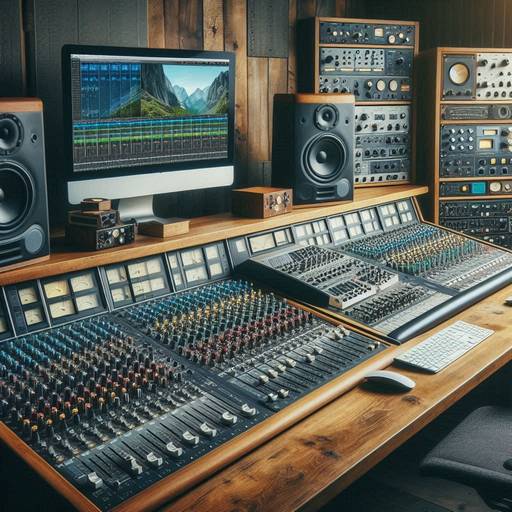Summary
Experienced Audio Engineer with a background in both live and studio environments, adept at utilizing a wide range of digital and analog audio equipment.
Proficient in mixing and mastering tracks using advanced nonlinear software such as Logic Pro as well as ability to learn on the site.
Demonstrated ability to integrate complex technology systems and troubleshoot equipment issues swiftly across various media platforms.
Live and Studio
Audio Engineering Experience
Details
Live Audio
- Sound Reinforcement: Understanding of how to amplify and distribute sound effectively in various live settings.
- Mixing Consoles: Proficiency with analog and digital mixing consoles, including setup, operation, and troubleshooting.
- Signal Processing: Use of equalizers, compressors, gates, and other signal processors to enhance audio quality.
- Microphone Techniques: Knowledge of various microphone types and techniques for capturing sound in live environments.
- Monitoring Systems: Experience with setting up and managing monitor systems.
- Live Sound Engineering: Live mixing experience in different size locations indoor and outdoor.
- Troubleshooting: Problem-solving skills for addressing audio issues and equipment malfunctions during performances.
- Audio Networking: Knowledge of digital audio protocols and networked audio systems.
- Venue Acoustics: Ability to assess and adapt to different acoustic environments and optimize sound quality accordingly.
- Stage Setup: Experience in arranging and managing stage layout, including placement of microphones, instruments, and other audio equipment.
- Signal Flow: Understanding of audio signal paths and connections from sources through mixing to amplification and output.
- Safety Practices: Awareness of electrical safety and proper handling of audio equipment to prevent accidents and ensure safety.
- Event Coordination: Ability to work closely with performers, event organizers, and other technical staff.
- Software: Familiarity with live sound software tools for mixing, recording, and managing audio setups.
- Feedback Prevention: Techniques for minimizing and managing feedback and ensuring clear audio reproduction.
- Backup Systems: Knowledge of backup strategies and redundancy planning to minimize the risk of audio system failures.
- Communication Skills: Verbal and written communication abilities to effectively coordinate with team members and artists.
Studio Audio
- Recording Techniques: Knowledge in capturing high-quality audio using a variety of microphones, preamps, and recording techniques.
- Mixing: Proficiency in mixing multiple audio tracks into a final mix.
- Mastering: Knowledge of the final stage of audio production, including optimizing tracks for various formats and platforms while maintaining audio integrity.
- Digital Audio Workstations (DAWs): Knowledge in using DAWs such as Logic Pro, Pro Tools, and others for recording, editing, and mixing tools.
- Signal Processing: Proficiency with outboard gear and plugins, including equalizers, compressors, limiters, and reverb units.
- Audio Editing: Editing techniques such as cutting, crossfading, time-stretching, and pitch correction.
- Acoustic Treatment: Knowledge of studio acoustics and the ability to implement acoustic treatments to enhance sound quality.
- Microphone Placement: Skill in selecting and positioning microphones to achieve desired sound characteristics and minimize unwanted noise.
- Audio Routing: Understanding of signal flow, patchbays, and routing configurations to manage complex audio setups efficiently.
- Mix Bus Processing: Ability to use bus processing techniques to enhance the overall sound of a mix, including parallel compression and saturation.
- Music Theory: Basic understanding of music theory to effectively communicate with musicians and producers and make informed decisions during mixing and mastering.
- Technical Maintenance: Skills in maintaining and troubleshooting studio equipment, including microphones, preamps, audio interfaces, and cables.
- Sound Design: Ability to create and manipulate sounds using synthesizers, samplers, and other sound design tools.
- File Management: Proficiency in managing audio files, including organization, backup, and archiving of session data.
- Collaboration: Experience working collaboratively with artists, producers, and other engineers to achieve the best possible sound.
- Dynamic Range Control: Knowledge of techniques to manage and balance dynamic range in recordings and mixes.
- Format Conversion: Ability to convert audio to various formats and specifications for different distribution platforms and media.
- Creative Problem-Solving: Innovative approach to overcoming challenges and finding creative solutions to audio issues.
- Communication Skills: Effective communication with clients and team members to understand their vision and deliver results that meet their expectations.
- Client Relations: Understand creation is a personal venture and not everyone may see the client’s end vision through out the process.
- Suggestive Influence: Understand that the client’s choice is the ultimate decision but suggestive influence can be useful.
- Personal Taste and Opinions: Everyone’s got one.
- Loops – Beats: All day

